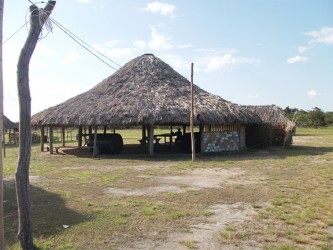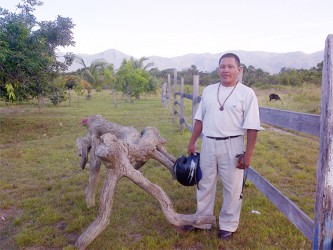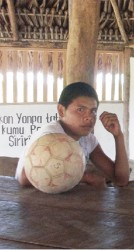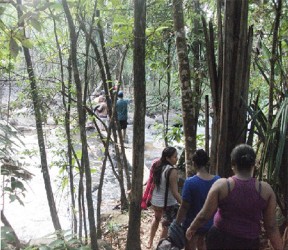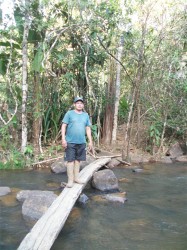Most people pass the scattered, thatched-roofed, mud-brick huts of Kumu without stopping and head directly to the white spray of the Kumu Falls to splash about in the cold waters roaring off the mountain.
The falls, which lie at the foot of the Kanuku Mountains, has been attracting visitors for years and in recent times, with the development of trails, the number of local, as well as Brazilian, tourists have increased. “There are times when the Brazilians alone come; you don’t find Guyanese,” said Peter Joseph, who constructed tiny thatched huts, cleared the road and built a bridge leading to the falls, and now calls the jungle clearing his office.
A free-lance tour guide, Joseph’s drive to develop the falls as a tourist attraction is paying off as visitor numbers increase. The area is relatively unspoiled and the water tumbles over the gray-brown rocks in a cold, never-ending white spray amid the different shades of green of the surrounding jungle. Here, in the cold mountain stream that splashes its way across the boulders of the Kumu Creek, the cares of the world can be washed away.
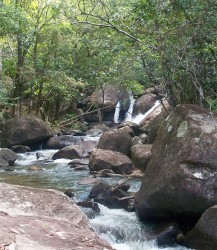
Joseph wants to develop a resort here and his dream is that one day, he can have some lodges and a conference hall there, creating employment for persons from Kumu, who like many communities in the Rupununi, leave to find jobs. Since January, about 50 persons on average visit the falls on the weekend, Joseph said. It costs $1000 to enter, with the word spread by visitors who enjoyed the falls. “I’m trying to build a really good foundation before I start a resort,” Joseph said.
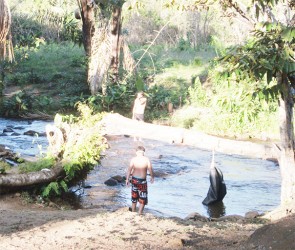
Where the gently rolling savannahs meet the towering Kanuku Mountains, there are other attractions with day-picnics also offered by Joseph to the 3,500 feet Schomburgk’s Peak, the highest mountain in this part of the Kanukus. At the top of the mountain, he said, is the habitat of the rare cock-of-the-rock and here the males court the females on the flat rocks on the peak and visitors who make the day-long trek always get to see the gymnastics of this mating dance. The package for this trip is US$200 per person which includes pick-up from Lethem, meals, tent and hammock and draggers.
In the nights from the top of the peak, Joseph said, the lights of the surrounding villages as well as Lethem and as far as Normandy, Brazil, can be seen. Persons on the day-trek sleep on top of the rock at the peak of the mountain. “It’s like having the world in your hand, it’s fantastic up there,” he said, describing the view as breathtaking and beautiful. Persons could even make cell phone calls from the top of the mountain, he said while one Republic Day, persons set off fireworks from the top of the mountain.
Joseph said that he has been trying with the venture for a long time and he wants people who are interested in the venture and not for the profits. “Things are possible but you have to work hard towards it,” he said. He said that by year-end, he wants to build a bar and a little restaurant. Joseph said that his grandparents were one of the first farmers in the area and each family in the community had portions of land they used for farming and he was lucky that the current location, was used by his family.
In Kumu proper, the houses are scattered. Some are built of concrete and zinc but most are built of mud-brick and thatched-roofs. The Senior Councillor is Emric Francis who is also a Regional Councillor. He said that Kumu got its name from a plant used that was “finer than nibbi.” There are old “sacred sites” in the mountains.
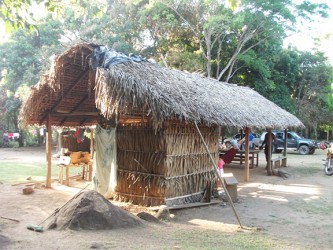
Approximately 400 persons, mainly of the Macushi tribe, reside in the community. Kumu is a satellite village of St Ignatius and many of the older residents are subsistence farmers. How-ever, there is a community trac-tor for persons who have excess produce to transport to Lethem for sale. Francis said that they want to do savannah farming on the flat lands.
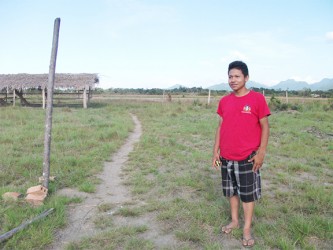
Persons usually leave the community to seek other jobs in Lethem, Brazil, or in mining, he said. The village was involved in a project to raise cattle but they lost a lot to jaguars, he said. Pumas are also a threat, he said, and for this year, they lost about two horses.
Kumu has a primary school and the only church there is the Roman Catholic Church. Francis said that they were also trying to get a water system in place due to the hardships encountered during the dry season. Most persons usually get water from the creek for drinking and other domestic purposes. He said that they also want electricity supply for the entire community.
The young people in the community are slowly losing their culture but the older persons want to revive this, Francis said.
